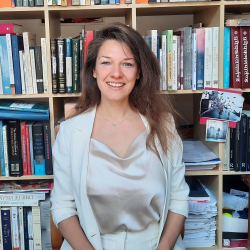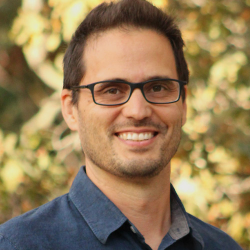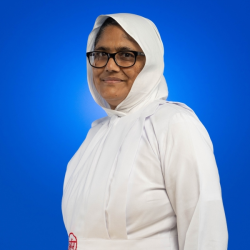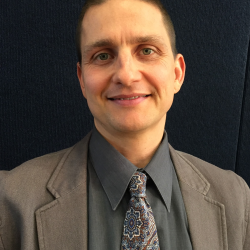
The Future of Jain Studies
May 13, 2024
8:00 - 9:30 AM PST
Presenter: Marie-Hélène Gorisse, University of Birmingham
Presenter: Tine Vekemans, Ghent University
Presenter: Christopher Jain Miller, Vice President of Academic Affairs, Professor of Jain & Yoga Studies, Arihanta Institute
Presenter: Tine Vekemans, Ghent University
Presenter: Christopher Jain Miller, Vice President of Academic Affairs, Professor of Jain & Yoga Studies, Arihanta Institute

Marie-Hélène Gorisse is Assistant Professor in Jain Studies in the Department of Theology and Religion at the University of Birmingham, where she leads the “Dharmanath Network in Jain Studies”, which enhances the societal impact of Jainism, interfaith and non-violence through continuous engagement with political, cultural and religious institutions. She is a member of the “Jain Philosophy Research Group” and specialises in Jainism and in the way its epistemology and hermeneutics developed in dialogue with other South Asian philosophico-religious traditions.
She also works on the contemporary relevance of Jainism as a contributor to global philosophy of religion, as co-PI of the Templeton project “Global Philosophy of Religion: Fundamental Spiritual Reality, Human Purpose, and Living Well”.

Professor Tine Vekemans holds the Ācārya Mahāprajña Chair for Jain Studies at Ghent University. Additionally, she is a postdoctoral research fellow funded by the University’s Special Research Fund (BOF). Her approach to Jain studies combines ethnography with textual study, but always starts from practices and experiences of Jains. Over the past decade, her research touched upon diverse aspects of modern Jainism, including Jain migration history, changing lay- mendicant relations, Jainism in the digital age, and processes of knowledge transfer in the Jain diaspora. Her recent book, Digital & Diaspora – Intertwined Frontiers of Jainism, won the 2023 Bhagwan Kunthunatha Annual Best Book Award.

Christopher Jain Miller, the co-founder and Vice President of Academic Affairs at Arihanta Institute, completed his PhD in the Study of Religion at the University of California, Davis. He is Professor of Jain and Yoga Studies at Arihanta Institute, Visiting Researcher at the University of Zürich's Asien-Orient-Institut, and Professor of Engaged Jain Studies at Claremont School of Theology. Christopher's primary fields of research interest are Yoga Studies and Engaged Jain Studies, and he currently serves as the co-chair of the Yoga in Theory and Practice Unit at the American Academy of Religion as well as on the steering committees for the Dharma Academy of North America (DANAM) and the Yoga Darśana Yoga Sādhana conference. Christopher is the author of Embodying Transnational Yoga: Eating, Singing, and Breathing in Transformation (Routledge 2024) and the co-editor of Engaged Jainism: Critical and Constructive Studies of Jain Social Engagement (SUNY 2025) as well as Beacons of Dharma: Spiritual Exemplars for the Modern Age (Lexington 2020).
The Future of Jain Studies
This panel considers the future of Jain Studies from particular methodological standpoints. The speakers emphasize the collaborative approach of European Jain Studies, demonstrating how their research, geographically situated within Europe, forms partnerships with collaborators across borders and institutions.
Christopher Miller will discuss, in dialogue with collaborators Cogen Bohanec (Arihanta Institute), Jonathan Dickstein (Arihanta Institute), and Venu Mehta (Claremont School of Theology), the methodology of Engaged Jain Studies from the forthcoming volume Engaged Jainism (Miller and Bohanec, SUNY 2025). He will feature the ways in which an Engaged Jain Studies methodology is necessary and useful while performing collaborative research projects with members of the Jain community and Jain institutions globally. The methods of Engaged Jain Studies create a research space where Jain and non-Jain ways of knowing can meet, collaborate, and, at times, experience irreconcilable frictions that generate productive research data and scholarly insights.
In dialogue with guests Mehool Sanghrajka (Institute of Jainology), Ana Bajželj (University of California Riverside), and Anil Mundra (Rutgers), Marie-Hélène Gorisse will first discuss the types of collaborations that develop between academic institutions, the Jain community, and other relevant partners such as social or artistic institutions. This will notably prompt us to focus on the question of the establishment and preservation of collections in Jain studies. She will then examine the growth of Jain philosophy as a discipline, presenting its current directions and challenges.
Together with guests and collaborators Manish Mehta (JAINA) and Yifan Zhang (Ghent University), Tine Vekemans will discuss studies on contemporary Jainism and Jainism outside of South Asia. As much of early Jain studies was of a philological nature, anthropological and sociological studies into Jain communities and practices are of a relatively recent date. Therefore, much is yet to be explored in order to balance interpretations based on doctrinal expectations on the one hand, and observations of the Jain tradition as it is experienced and performed by Jains on the other, and achieve a nuanced understanding of what Jainism was, is, and can be.
Christopher Miller will discuss, in dialogue with collaborators Cogen Bohanec (Arihanta Institute), Jonathan Dickstein (Arihanta Institute), and Venu Mehta (Claremont School of Theology), the methodology of Engaged Jain Studies from the forthcoming volume Engaged Jainism (Miller and Bohanec, SUNY 2025). He will feature the ways in which an Engaged Jain Studies methodology is necessary and useful while performing collaborative research projects with members of the Jain community and Jain institutions globally. The methods of Engaged Jain Studies create a research space where Jain and non-Jain ways of knowing can meet, collaborate, and, at times, experience irreconcilable frictions that generate productive research data and scholarly insights.
In dialogue with guests Mehool Sanghrajka (Institute of Jainology), Ana Bajželj (University of California Riverside), and Anil Mundra (Rutgers), Marie-Hélène Gorisse will first discuss the types of collaborations that develop between academic institutions, the Jain community, and other relevant partners such as social or artistic institutions. This will notably prompt us to focus on the question of the establishment and preservation of collections in Jain studies. She will then examine the growth of Jain philosophy as a discipline, presenting its current directions and challenges.
Together with guests and collaborators Manish Mehta (JAINA) and Yifan Zhang (Ghent University), Tine Vekemans will discuss studies on contemporary Jainism and Jainism outside of South Asia. As much of early Jain studies was of a philological nature, anthropological and sociological studies into Jain communities and practices are of a relatively recent date. Therefore, much is yet to be explored in order to balance interpretations based on doctrinal expectations on the one hand, and observations of the Jain tradition as it is experienced and performed by Jains on the other, and achieve a nuanced understanding of what Jainism was, is, and can be.





